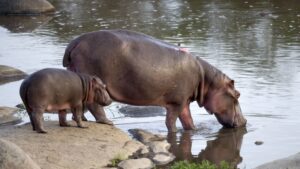When Sharon booked her South African safari with Discover Africa, she was so excited to go on game drives across the savannah to see the Big Five. Lions, elephants, leopards, buffaloes, and rhinos were all on her list. Within the first 24 hours at Timbavati Private Reserve, her initial safari destination, she ticked all these animals off her list. However, one of the highlights of her trip was her stay at Arathusa Safari Lodge in Sabi Sands Nature Reserve, where her suite faced a watering hole. She was able to simply relax and watch a family of hippos bob around, with other wildlife making appearances, too. Hippos in Africa are a quintessential sight, so let’s learn more about them and exactly where on the continent you can find them.
Facts About Hippos in Africa
Did you know that hippopotamuses spend up to 16 hours a day in water to keep their bodies cool under the hot African sun? Hippos are one of the largest vegetarians in Africa, with males often reaching a size over 1,400 kg/3,086.47 lb. They also have very few, if any, natural predators.
Most people think that hippos float or swim in water; however, their hooves are not suited to swimming at all. In fact, they run on the waterbed at approximately 8 km/h (5 mi/h) and 30 km/h (18.6 mi/h) on land! It’s the hippos’ size and enormous jaws that make them so feared.
Their temperament also adds to their status as one of the most dangerous animals on earth. They’re highly territorial and aggressive, particularly when females have young or males are protecting their harems. Hippos are even able to bite a grown crocodile in half!
Hippos secrete a pinkish fluid from their skin, which can resemble blood, but it acts as a moisturiser and sunblock.
These African icons can also close their nostrils and ears to stop water from entering. This gives baby hippos the ability to suckle underwater!
Here are five of the best national parks and regions in Africa to see hippos while on safari:
1. Serengeti National Park, Tanzania
The Serengeti National Park is a great place to spot hippos. There are numerous waterholes where hundreds of hippos wallow.
Situated where the Seronera and Orangi rivers converge in the Central Serengeti, Retina Hippo Pool is a must-stop to see hippos! Hundreds of hippos congregate in this water source to play and keep cool.
You may also spot crocodiles gliding past as well as waterbirds and waders for the birders in your group.

2. Kruger National Park, South Africa
South Africa’s Kruger National Park is one of the most famous safari destinations in the world, and for good reason. It’s a Big Five hotspot well known for regular sightings of lions, leopards, elephants, buffaloes, and rhinos. That’s certainly not where the wildlife adventures end, though. Hippos are also a main feature of a Kruger safari.
The region is home to many rivers and dams where hippos bathe and wallow. Some of the major rivers include the Crocodile River, Olifants River, Luvuvhu River, Letaba River, and Sabie River.
Kruger National Park also shares unfenced borders with reserves like Sabi Sands and Timbavati, offering exclusive safari experiences with fewer crowds.
3. Hluhluwe-Imfolozi Park, South Africa
One of the oldest game reserves in Africa, Hluhluwe-Imfolozi Park, situated in KwaZulu Natal, is well-known for its large population of white rhinos. It’s a fantastic safari destination to see this near-threatened species and the second biggest animal in Africa. However, it’s home to the third biggest animal in Africa, too: the hippo!
Hippo sightings are common in Hluhluwe National Park thanks to the three rivers flowing in the valleys, including the Hluhluwe River with its string of pools. If you go on a nighttime game drive, you might just spot hippos outside of their pools, munching on grass. In fact, they can consume up to 35 kg/77 lb of grass per evening!
4. iSimangaliso Wetland Park, South Africa
iSimangaliso Wetland Park is a UNESCO World Heritage Site and home to the largest population of hippos in South Africa. The park’s centrepiece is the vast Lake St. Lucia, where you’ll see the overwhelming number of hippos.
One of the best ways to spot hippos here is to go on a boat cruise. This water-based safari will take you along the lake to spot these animals (sometimes you’ll just see their ears and eyes peeking out!) and crocodiles with whom they share the lake.
5. Okavango Delta, Botswana
Hippos are one of the iconic animals of Botswana’s Okavango Delta. One can often hear the honking noises of the pods throughout the waterways as you explore during game drives.
When on an Okavango Delta safari, don’t miss out on navigating the waterways on a mokoro expedition. A mokoro is a traditional dugout canoe. With a guide, you’ll discover this fascinating and beautiful UNESCO World Heritage Site and the abundance of wildlife that call it home.
Seeing hippos in Africa is an exciting experience when on safari. These massive mammals are a highlight, whether you see them wallowing in the water or chomping on grass during a nighttime game drive.
Author: Tiffany Bowers
Published:
Last Update:
Part of the Botswana Safari Collection